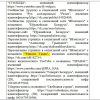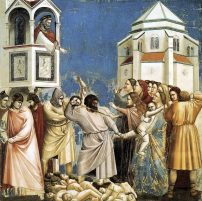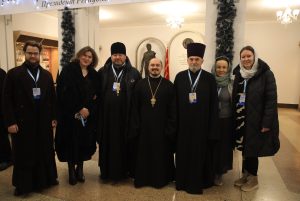Religious Freedom Conditions in Belarus

By Dylan Schexnaydre, Researcher, UNITED STATES COMMISSION on INTERNATIONAL RELIGIOUS FREEDOM
December 2023
Overview
The religious freedom situation in Belarus continues to deteriorate as Belarusian President Alyaksandr Lukashenka subjugates every aspect of social life to the state’s security and bureaucratic apparatuses. Following popular protests against the fraudulent 2020 election which kept President Lukashenka in power, authorities launched a brutal and ongoing crackdown on civil society that has transformed the country into a totalitarian state, with the government perceiving any activities independent of its control as a threat to its existence. The government has banned or shut down independent media, non-governmental organizations (NGOs), and opposition political parties and criminalized engaging with these organizations. Law enforcement has regularly imprisoned, tortured, denied medical care to, and killed prodemocracy protesters, opposition politicians, journalists, and human rights activists for peacefully expressing their views, assembling, or documenting government abuses.
The state has not exempted religious communities from this overwhelming pressure and has sought to re-exert its authority to regulate religious affairs. In 2023, Belarus’ parliament considered adopting a new religion law that would impose stricter requirements on religious communities and unjustifiably prohibit them from certain religious and political activities. Law enforcement agencies harass Protestants who conduct ordinary religious activities without state approval, and local authorities pressure Roman Catholics by targeting their houses of worship, including Minsk’s iconic Church of Saints Simon and Helena (also known as the Red Church). Christian religious leaders of all denominations are often detained, fined, imprisoned, and forced into exile for activities that the state perceives as political in nature. From 2004 to 2012, the U.S. Commission on International Religious Freedom (USCIRF) had previously placed Belarus on its tier two “Watch List” for its government’s violations of religious freedom.
This country update provides an overview of religious freedom conditions in Belarus in 2023, including the impact of expanding government repression on religious communities.
Religious Demographics
The U.S. government estimates that Belarus has a population of 9.4 million. According to a 2016 survey by Belarus’ State Information and Analytical Center of the Presidential Administration, 53 percent of the country’s adult population belongs to the Belarusian Orthodox Church, 6 percent belongs to the Roman Catholic Church, 8 percent identifies as atheist, and 22 percent identifies as “uncertain.” Other religious groups constituting less than 2 percent of the population include Jews, Muslims, Greek Catholics, Old Believers, other Orthodox Christians, Jehovah’s Witnesses, Protestants, members of the International Society of Krishna Consciousness, and many others. Roughly 3 percent of Belarus’ population consists of ethnic Poles, who are predominately Roman Catholic.
New Religion Law and Other Legal Developments
2002 and 2023 Religion Laws
For over two decades, the Belarusian state has sought to systematically regulate religious life in the country — albeit to varying degrees. While Belarus’ 2002 law On Freedom of Conscience and Religious Organizations (religion law) guaranteed freedom of religion or belief to all citizens, it also imposed several burdensome bureaucratic measures that religious groups must adhere to in order to conduct their activities legally. This included registering their activities with the state, limiting the locations where religious activities could occur without prior government approval, and subjecting religious materials used by missionaries to review. Authorities could also liquidate religious communities for carrying out activities perceived as against the country’s “sovereignty” among other reasons. However, prior to the 2020 protests, government officials typically refrained from strict enforcement of the law and instead engaged in administrative harassment and bureaucratic obstruction such as not approving religious registration applications or materials consistently or in a timely manner.
In June 2023, authorities introduced a new, more repressive religion law in an apparent attempt to reconsolidate control over religious communities. The June draft law recycled and modified several problematic articles found in the current law and introduced new requirements and restrictions for religious communities. In October 2023, the parliament began considering a modified version of the June draft called “On Amendments to Laws on the Activities of Religious Organizations” that maintained most of the provisions of the original draft. Moreover, the new religion law provides the government with a pretext to effectively ban certain religious communities and eliminate elements of religious society that the state perceives as challenging its authority.
The new proposed religion law would require religious communities to re-register with the state within a year. To register, each community must submit an application with its charter, documentation of its right to gather at the location specified in its charter, and the personal information, including the full names, phone numbers, and home and work addresses, of at least 20 members who are over the age of 18. While the previous religion law required the same information, the current crackdown on civil society raises concerns that the government may misuse the information to target religious community members or that some communities would withhold the information due to those fears, resulting in the denial of their registration. Authorities had previously denied registration to opposition political parties that refused to provide such information due to security concerns during their re-registration process.
The proposed law reaffirms Belarus’ tiered religious group system that grants larger religious organizations the exclusive rights to establish monasteries, religious missions, and religious educational institutions through an additional registration process. The proposed law does, however, increase the requirements to qualify for these higher tiered statuses. National religious associations must include 15 religious communities operating in all the regions of Belarus and the city of Minsk, with at least one of these communities active in the country for 30 years. The current law only requires a national religious association to list 10 communities operating in at least four of Belarus’ six oblast regions, with one community active for the last 20 years. Regional religious associations must include at least 10 religious communities in one or other nearby regions. The proposed law also explicitly limits religious organizations to conducting charitable activities solely for the elderly, disabled, and citizens suffering from substance abuse. Only monasteries would be able to establish children’s homes for orphans.
The draft law recognizes the special role the Belarusian Orthodox Church has played in the country’s historical, cultural, and spiritual formation. It also emphasizes the importance of the Catholic Church, Lutheran Church, Judaism, and Islam in Belarus. If a religious community previously “unknown” to the government attempts to register, it must submit for state review the group’s religious beliefs and practices, historical development, and views on family, marriage, education, performance of public duties, public health, and restrictions on civil rights and obligations.
The proposed law furthermore requires all religious communities to:
— Display the religious organization’s full name and confessional affiliation when conducting religious activities;
— Submit a notification of the replacement head of a religious community within 10 days of the individual’s appointment; and
— Submit imported missionary literature and other related materials for government review.
The new law would not only require certain actions from religious communities but also prohibit a range of items and activities, including but not limited to:
— Participating in, funding, or supporting political activities;
— Using non-religious symbols in places of worship;
— Engaging in speech that insults government officials or representatives of other religions and their followers in places of worship;
— Using texts and images that incite hatred, offend the “religious feelings” of citizens, or promote other “extremist” activities in places of worship;
— Using religious property in ways not specified in a community’s charter, including for political purposes or carrying out “terrorist” or other “extremist” activities;
— Promoting religious education and related materials that contradict the generally accepted “traditional values” and “ideology” of the Belarusian state or justify the propaganda of war, social, ethnic or religious hatred;
— Conducting religious education in languages other than state recognized ones (Belarusian and Russian);
— Engaging in religious activity without registration;
— Engaging in missionary activities in residential buildings, outside of government-approved locations, or by persons not approved by the governing body of a registered religious community; and
— Distributing religious literature in residential buildings and public transport facilities.
Several key phrases such as “offend religious feelings,” “traditional values,” and “ideology of the Belarusian state” lack clear definitions and could therefore contribute to the criminalization of peaceful expressions of religious beliefs. The state furthermore would have the power to liquidate religious communities for violating these and other vaguely worded prohibited activities, including acting against Belarus’ sovereignty, domestic and foreign policy, constitutional system, and civil harmony; discrediting Belarus and promoting hatred, other extremist activities, and humiliation of national honor and dignity; preventing citizens from fulfilling their state and public duties; and harming the health and morals of citizens.
The retooling of the religion law demonstrates the government’s intent to provide itself with a more encompassing legal framework to regulate religious life and crack down on religious individuals and groups. In August 2023, three United Nations special rapporteurs, including the Special Rapporteur on freedom of religion or belief Nazila Ghanea, urged the government to review and reconsider key portions of the June draft religion law that would “fail to meet Belarus’ obligations under international human rights law.” In November 2023, the draft religion law passed its second reading in the parliament.
“Extremist” Materials and Organizations
The Belarusian state has weaponized a wide range of vaguely worded, questionable criminal statutes to punish dissent and decimate independent civil society, with trumped-up charges and restrictions related to so-called “extremism” regularly applied. Belarus’ law On Combating Extremism defines “extremism” very broadly as any activity that threatens the country’s “independence, territorial integrity, sovereignty, and foundations of constitutional order,” without necessarily requiring the use or advocacy of violence. In practice, this ambiguity allows the government to criminalize any activity, speech, expression, and assembly it opposes. The Ministry of Internal Affairs (MoIA) has labeled “extremist” more than a hundred organizations and 2,000 individuals, and Belarusian courts have designated “extremist” a list exceeding 3,000 materials, which includes printed and online publications, social media pages, and symbols. Citizens can face administrative and criminal prosecution with punishments ranging from fines to lengthy imprisonment for engaging with an organization, individual, or material designated “extremist.” In recent years, authorities have even arrested, fined, and detained Christian religious leaders for “distributing extremist materials,” which will be discussed in greater detail later in this report.
Belarus has designated religious literature, websites, and social media pages affiliated with religious groups, and other religious content as “extremist” materials. In the last year, courts have declared extremist a YouTube interview with an exiled Roman Catholic priest, the book Interpretation of the Ten Last Juz of the Noble Qur’an, Greek Catholic news website Tsarkva, and several materials belonging to the Pentecostal New Life Church, including its website, social media pages, and a prayer that mentioned government human rights abuses.
Between August and September 2023, various courts declared “extremist” the social media pages and symbol of Christian Vision, a Christian group that provides commentary on religious freedom in Belarus and documents human rights violations against Belarusian religious leaders, religious lay persons, and religious communities.
Authorities have also declared “extremist” several independent media outlets and human rights organizations that regularly report on religious freedom and other human rights issues within Belarus. In late 2021, the MoIA added independent Belarusian news channel Belsat and U.S. broadcaster Radio Free Europe/Radio Liberty’s Belarusian language news service Radio Svaboda to its registry of extremist organizations. Since then, law enforcement agencies have imprisoned affiliated journalists for their work and others — including religious figures — who simply repost their content on social media. In August 2023, the MoIA declared Viasna, the country’s premier human rights organization which regularly reports on human rights violations against religious leaders, an “extremist formation” and included about a hundred websites, accounts, materials, and information tied to Viasna as “extremist.” Five of Viasna’s members, including chairperson and Nobel Peace Prize laureate Ales Bialiatski, remain in prison on political charges tied to their human rights work.
Other Administrative and Criminal Offenses
Other legislation and elements of Belarus’ administrative and criminal codes remain problematic for the free exercise of religion or belief. For example, law enforcement agencies have fined several religious leaders and other persons engaging in religious activities for organizing a “mass event” without government permission, which will be highlighted further in the next section. Following amendments to the state’s Mass Events Law that went into effect in June 2021, organizers of so-called “mass events” must get approval from authorities prior to advertising an event. Violations of the law can result in administrative detention, fines, and up to three years’ imprisonment.
In January 2022, the country reinstated a criminal statute that authorities had abolished three years prior to punish activity in unregistered or forcibly dissolved nongovernmental organizations, including religious organizations, with fines or up to two years’ imprisonment. Additionally, authorities have reportedly threatened to charge those who publicly share their religious beliefs with others with “incitement of racial, ethnic, religious or other social hatred,” which entails a penalty of up to five years in prison.
New Life Church and Other Protestant Communities
Protestant communities refusing to submit to the state’s strict regime of control have faced surveillance, harassment, detention, fines, and various other obstacles to or punishments for their religious activities. Among the religious groups enduring the most repression in Belarus is the Pentecostal New Life Church, which has had a zoning dispute with authorities over its church property since 2002. In recent years, the government ramped up its targeting of New Life Church after the latter took a public stance, including through prayer, to support the protest movement that emerged after the 2020 fraudulent election and criticize state officials involved in human rights abuses and violence against protesters. In February 2021, police forcibly evicted New Life Church from its building during religious services. In September 2022, authorities detained New Life Church Pastor Vyacheslav Goncharenko and fined him 3,200 rubles ($973) for holding religious services in the parking lot beside the closed church. Authorities also detained Pastor Antoni Bokun, a Baptist pastor from another church who participated in the service, and fined him the same amount. Both pastors were charged with organizing an unauthorized mass event.
In June 2023, authorities bulldozed New Life Church and the following month blocked the group’s website for a period of six months, accusing it of publishing “extremist” information and “building up threats to national security.” That same month, New Life Church received an official government letter renewing demands that it owed 458,918 rubles ($139,516) in taxes. In August 2023, 20 armed police officers reportedly searched Pastor Goncharenko’s home and detained him and Ilya Budai, Goncharenko’s son-in-law and New Life Church’s youth pastor. A court later sentenced Goncharenko to 10 days of administrative detention and Budai to five days for disobeying police and disorderly conduct, respectively. Courts then declared “extremist” New Life Church’s website, social media pages, and the materials posted on those pages, including prayers that condemned Belarusian officials involved in human rights violations. In September 2023, the Minsk City Executive Committee initiated proceedings to liquidate New Life Church for violating the country’s religion law on account of its so-called “extremist” activities. In October 2023, a court in Minsk liquidated New Life Church.
Courts have imposed various punishments on members of other Protestant denominations for their unauthorized religious activities. In July 2022, a court fined Pastor Dmitry Podlobko 640 rubles ($195) for performing outdoor baptisms on his family’s privately owned property. In August 2022, a Gomel court fined two members of another Protestant church 640 rubles ($195) each for holding unauthorized baptisms. In April 2023, police in Minsk detained seven members of several Protestant denominations — the majority from New Life Church — for talking about their religious beliefs with passers-by. The Central District Court in Minsk subsequently fined them each between 3,330 ($1,012) and 3,700 rubles ($1,125). In May 2023, police in Drogichin detained several members of the Baptist Council of Churches for talking about their faith in the city’s main square and passing out religious literature. A judge later fined one of those Baptists, septuagenarian Vladimir Burshtyn, 555 rubles ($169). In July 2023, the Malorita District Prosecutor summoned Burshtyn and allegedly threatened to criminally prosecute him for inciting hatred if he continued to share his beliefs in public.
Roman Catholic Churches and Other Religious Groups
Authorities in recent years have imposed arbitrary restrictions and numerous fees on religious communities for using government-owned religious buildings — measures that Roman Catholics perceive as intended to pressure their community. The 2020 protests exacerbated tensions between the Roman Catholic Church and the Belarusian government, as the government viewed the Church and its clergy as actively supporting the opposition.
In September 2022, government officials closed Minsk’s Roman Catholic Church of Saints Simon and Helena (the Red Church) after a mysterious fire broke out in a small annex. Since then, the church has remained closed for government-ordered repairs, despite eyewitness reports of minimal damage limited to the sacristy. Officials have provided no timetable for the completion of repairs and have forbidden parishioners from using the church and its surrounding areas for customary religious activities. Many believe the church’s indefinite closure to be tied to the role it played during the country’s 2020 protests when protesters rallied at and even fled into the church for protection from police violence.
Law enforcement agencies have sometimes prohibited religious activities at or near the Red Church since its closure, citing the prohibition on mass events. In October 2022, police reportedly harassed the parish’s priest and a group of parishioners praying the rosary outside of the church. In April 2023, officials rejected the parish’s request to hold Easter services in the parish rectory, and in May 2023, the parish announced it would not participate in the Minsk Corpus Christi procession for undisclosed reasons.
The state also refuses to hand over Roman Catholic churches seized during the Soviet period. Instead, it has reportedly imposed rent on parishes or charged them for unrequested renovations that do not meet the communities’ needs. Prior to the closure of the Red Church, city officials had been charging the parish roughly 13,000 rubles ($3,952) a month in rent, and by July 2020, the Red Church reportedly owed more than 160,000 rubles ($48,642) in taxes and for restoration work. In January 2023, the parish priest of the Immaculate Conception of the Blessed Virgin Mary Church in Babruysk announced the parish would begin paying an undisclosed amount of money to the government to rent the church, despite not having to pay rent previously. Officials allegedly threatened to give the church to a museum and furthermore restrict parishioners’ ability to use the church for religious purposes if they did not enter into a rental agreement.Officials had imposed rent on other Roman Catholic churches under similar threats. Such agreements have not been made public.
In July 2023, police raided the Cathedral of the Blessed Virgin Mary in Minsk and beat priests who refused to let them search their phones for incriminating materials. The raid came after security forces arrested a catechist affiliated with the church in May for disseminating “extremist” materials. Two of the church’s priests, Yury Reshetko and Valery Dovgil, reportedly fled Belarus after the raid.
Authorities continued to prevent the Old Believer community in Minsk from building a church. In March 2022, the Minsk Region Executive Committee rejected an Old Believer application to build a church, forcing the community to continue to travel outside of Minsk to gather for worship.
Clergy and Laity Targeted for Perceived Political Activities
According to Christian Vision, the state has detained, fined, imprisoned, pushed out of their positions, or forced into exile at least 60 religious leaders of the Belarusian Orthodox, Roman Catholic, Greek Catholic, and various Protestant churches since the 2020 crackdown began. Such targeting of clergy has often come as a result of their perceived political activities — reflecting a broader trend of oppression facing all Belarusians. Belarus is estimated to have approximately 1,500 political prisoners.
In December 2022, Belarusian Orthodox priest Uladzislau Bahamolnikau was released after spending more than 90 days in pretrial detention for sending “extremist resources” to his mother. According to Christian Vision, Bahamolnikau endured harsh living conditions and caught COVID-19 while detained. In January 2023, police detained Belarusian Orthodox priest Dionisy Korostelev for praying in church for Ukrainian forces. The Belarusian Orthodox Church leadership subsequently banned him from religious services. In April 2023, the Centralny District Court of Minsk sentenced the elder at the New Earth Baptist Church, Andrei Mamoika, and his wife Vera, to two-and-a-half years of restricted freedom under home confinement for publishing online photos of the 2020 protests. That same month, authorities in Novalukoml detained and sentenced to 15 days’ administrative arrest Aleksandr Zaretski, pastor of the city’s Evangelical Church, for liking and commenting on materials recognized as “extremist.”
In May 2023, law enforcement across the Viciebsk region detained on the same day one Greek Catholic and two Roman Catholic priests in relation to their social media activity. Both Roman Catholic priest Viachaslau Adamovich and Greek Catholic priest Aliaksandar Shautsou faced charges of disseminating “extremist” materials and organizing an unauthorized mass event, with Shautsou spending 45 days in jail. In June 2023, riot police in Mogilev violently detained Pastor Siarhey Udalyou of the Evangelical Reformed “Calvinist Gathering” Church, reportedly in connection with his political activities or religious training in Ukraine. He was later released under unclear circumstances. In July 2023, a court in Navahrudak fined Roman Catholic priest Yury Zhegarin 555 rubles ($169) and confiscated his phone after police charged him with disseminating “extremist” materials for liking a Radio Svaboda article on social media in 2021. In August 2023, police detained Roman Catholic priest Antoni Adamovich and searched his church’s rectory after interrogating him and confiscating his phone. Police had tried to arrest him inside the church, but parishioners stopped them. A week later, it was revealed authorities charged Adamovich with distributing “extremist” materials.
Non-clergy political prisoners have also experienced violations of their freedom of religion or belief while in prison. Belsat noted that since the beginning of the nationwide crackdown, prisoners’ rights to access religious materials and participate in religious activities have been based on the arbitrary whims and regulations of individual prison administrators, with some denying, prohibiting, or confiscating religious items including Bibles, religious books and magazines, crosses, rosaries, and even Christmas cards. Prisoners have also been denied visits from clergy. On the rare occasions when such visits are approved, they are often heavily restricted or make certain religious activities like administering the sacrament difficult or impossible. Catholics and Protestants have reportedly faced more challenges than Orthodox prisoners as the Belarusian Orthodox Church maintains its own facilities in prisons and generally has greater access.
Conclusion
The decline in the freedom of religion or belief in Belarus is of grave concern. President Lukashenka’s government continues to severely repress civil society and ramp up efforts to regulate religious life. As the U.S. administration and Congress seek to address Belarus’ human rights concerns, they must prioritize the burgeoning crackdown on religious communities as part of those efforts.








